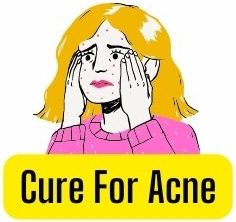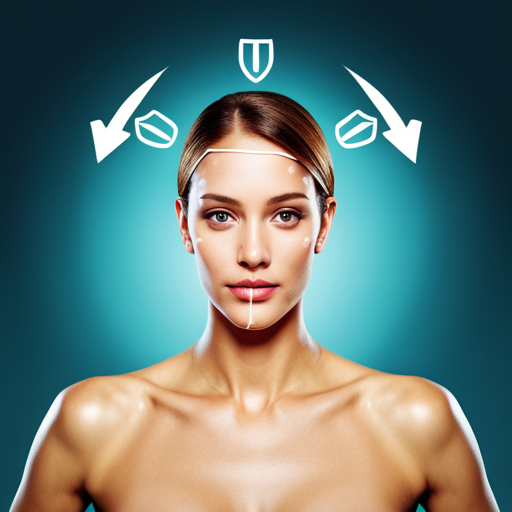Imagine a world where the struggle with acne, a common skin disorder affecting millions of people worldwide, is significantly reduced or even eradicated. A world where individuals can enjoy clear and healthy skin, free from the physical and emotional burdens that often accompany persistent acne breakouts.
This may seem like a distant utopia; however, recent scientific research has uncovered the potential of an essential trace element in achieving this goal: zinc.
Zinc’s role in promoting overall health has long been established, yet its impact on acne prevention remains relatively unexplored by the general public.
As new evidence emerges supporting the correlation between zinc levels and skin health, it becomes increasingly important to understand and appreciate this vital nutrient’s functions.
This article delves into the science behind zinc’s potential to mitigate acne development while providing practical guidance on incorporating topical applications and dietary sources of this mineral into daily skincare routines.
Ultimately offering invaluable tips for achieving a balanced regimen that supports both physical well-being and personal freedom from stubborn acne breakouts.
Key Takeaways
– Zinc plays a crucial role in skin health, immune system regulation, wound healing, and DNA synthesis.
– Adequate intake of zinc can positively impact skin health and potentially reduce or eradicate acne due to its anti-inflammatory, antioxidant, and immune-boosting properties.
– Topical zinc applications, such as creams and serums, can combat acne-causing bacteria, reduce inflammation, and promote overall skin health.
– Pairing zinc with other acne-fighting ingredients, such as niacinamide, salicylic acid, or azelaic acid, can significantly amplify the effectiveness of skincare regimens. Personalizing skincare regimens and incorporating lifestyle factors like diet, stress management, and sleep are also crucial for achieving and maintaining clear, healthy-looking skin.
Understanding Zinc and its Importance
Delving into the multifaceted nature of zinc reveals its vital importance in maintaining skin health and potentially mitigating acne breakouts.
This essential trace element plays a crucial role in several bodily functions, including immune system regulation, wound healing, and DNA synthesis.
Zinc benefits are numerous, with research demonstrating its potential to reduce inflammation, regulate sebum production, and promote the overall well-being of the dermis.
While there is still much to learn about this mineral’s actions within the body, current evidence suggests that adequate zinc intake can contribute positively to skin health.
In spite of these promising findings, it is important to approach acne myths with skepticism and rely on scientific evidence when considering treatment options.
Acne is a complex condition influenced by various factors such as genetics, hormones, diet, and lifestyle choices.
As such, it may be overly simplistic to attribute acne prevention solely to an individual’s zinc levels.
Nevertheless, incorporating sources of dietary zinc or supplements under professional guidance could potentially support overall skin health while promoting a sense of freedom from persistent acne concerns for some individuals.
Further research will continue elucidating the precise mechanisms through which zinc contributes towards optimal dermatological wellness.
The Science Behind Zinc and Acne Prevention
Examining the scientific relationship between zinc and acne prevention reveals that this essential mineral possesses anti-inflammatory, antioxidant, and immune-boosting properties, which collectively mitigate skin inflammation and promote a clear complexion.
A plethora of research studies support the efficacy of zinc in alleviating acne symptoms and its potential for preventing future breakouts.
One such study published in the Journal of Investigative Dermatology demonstrated that individuals with acne had significantly lower levels of zinc in their system compared to those with clear skin.
Furthermore, several clinical trials have reported positive outcomes when using oral or topical zinc formulations for acne treatment, with reductions in inflammatory lesions and overall severity.
Despite these promising findings, it is crucial to debunk prevalent zinc myths that may lead to misconceptions about its role in acne prevention.
It is important to note that while zinc can provide benefits as an adjunct therapy for treating acne-prone skin, it should not be considered a standalone solution for all types of acne or triggers.
Acne triggers vary among individuals due to factors such as genetics, hormones, diet, stress levels, and skincare routines – all of which play a role in determining the most effective course of treatment.
Therefore, understanding one’s unique set of circumstances and working closely with healthcare professionals can help determine how best to incorporate zinc into an individualized skincare regimen for optimized results and lasting freedom from breakouts.
Topical Zinc Applications for Acne
Investigating the efficacy of topical zinc applications for acne treatment involves exploring various forms, such as zinc oxide, and different formulations like creams and serums.
Research has demonstrated the numerous benefits of incorporating these topical agents into skincare routines to combat acne-causing bacteria, reduce inflammation, and promote overall skin health.
A comprehensive understanding of these topical zinc applications is essential to maximize their potential in addressing this prevalent dermatological concern effectively.
Zinc oxide
Focusing on zinc oxide, it is essential to understand its potential benefits for acne prevention and treatment. Often overshadowed by misconceptions regarding its efficacy and application, this mineral compound has been shown to possess several properties that can contribute to clearer skin.
Zinc oxide acts as an anti-inflammatory agent, reducing redness and inflammation associated with acne breakouts. Furthermore, it boasts antimicrobial properties that help combat acne-causing bacteria, thereby minimizing the risk of future outbreaks.
Several studies have demonstrated that using topical zinc oxide formulations can significantly improve mild-to-moderate inflammatory acne when applied consistently over time.
Moreover, this versatile ingredient not only addresses existing blemishes but also helps prevent new ones from forming by regulating sebum production – an excess of which often leads to clogged pores and subsequent breakouts.
In addition to being a potent weapon against acne, zinc oxide provides broad-spectrum sun protection as well as enhanced healing for damaged skin.
As a result, integrating products containing this multifaceted compound into one’s daily skincare regimen could ultimately pave the way towards attaining both physical liberation from persistent blemishes and psychological freedom from insecurities related to one’s complexion.
Debunking Zinc Misconceptions: Dispelling myths about zinc oxide’s effectiveness allows individuals to make informed decisions about incorporating it into their skincare routines.
Exploring Oxide Alternatives: Understanding the various forms of zinc available in topical treatments empowers consumers to choose the best option tailored to their needs.
Embracing Acne-Free Skin: By harnessing the power of zinc oxide in acne prevention, individuals can achieve healthier skin and regain a sense of confidence in their appearance.
Zinc creams and serums
Delving into the realm of zinc creams and serums unveils a treasure trove of possibilities for individuals seeking effective solutions to address their acne-related concerns while simultaneously promoting optimal skin health.
These products often contain zinc in various forms, such as zinc oxide, zinc gluconate, or zinc pyrithione, all known to have anti-inflammatory and antibacterial properties that help reduce redness, inflammation, and bacterial growth associated with acne.
Furthermore, these topical applications aid in enhancing zinc absorption directly into the affected areas of the skin by bypassing potential gastrointestinal malabsorption issues that could arise from oral supplementation.
Serum types are designed to cater to different skin needs; some focus on treating existing blemishes while others aim at preventing future breakouts or providing overall skin nourishment.
Zinc-infused serums often combine other beneficial ingredients like niacinamide (vitamin B3), salicylic acid (a type of beta-hydroxy acid), or tea tree oil – all known for their acne-fighting abilities.
In addition to reducing inflammation and combating bacteria responsible for causing acne flare-ups, these formulations may also contribute positively towards improving overall skin texture and tone by regulating sebum production and diminishing post-acne scarring.
While not an instant cure-all solution for every individual’s unique skincare requirements, incorporating a carefully chosen zinc-based cream or serum into one’s daily routine can be an integral component in achieving clear and healthy-looking skin.
Incorporating Zinc into Your Diet
Incorporating zinc into one’s diet is a crucial aspect of ensuring optimal health, as this essential trace element plays a significant role in various biological processes.
A myriad of food sources, such as oysters, red meat, poultry, and whole grains, are rich in zinc and can be consumed to maintain adequate levels in the body.
Moreover, zinc supplements are available for individuals who may have difficulty obtaining sufficient amounts through dietary intake alone or who require additional support due to specific health conditions.
Food sources rich in zinc
Abundant in various dietary sources, zinc can be found in foods such as oysters, red meat, poultry, beans, nuts, whole grains, and dairy products. Consuming a well-balanced diet with these items is essential to prevent zinc deficiency and promote overall health. Incorporating zinc-rich recipes into one’s daily meal plan can significantly contribute to the maintenance of healthy skin and potentially aid in acne prevention.
Zinc-rich food options include:
– Oysters: Known for being the highest source of dietary zinc
– Red meats: Beef and lamb are excellent sources of this mineral
– Poultry: Chicken and turkey provide moderate amounts of zinc
– Legumes: Beans, lentils, and chickpeas offer plant-based options for those who prefer non-animal sources
– Nuts and seeds: Almonds, pumpkin seeds, and cashews contain trace amounts of this essential nutrient
By incorporating these foods into the diet on a regular basis, individuals may experience an improvement in their skin condition due to the role that zinc plays in maintaining a healthy immune system response.
Moreover, engaging with educational resources about nutrition-related topics allows people to take control over their health choices while obtaining a sense of freedom through evidence-based knowledge.
Zinc supplements
For individuals who struggle to obtain sufficient zinc through dietary sources, supplementation may provide an effective solution for maintaining optimal levels of this essential mineral and promoting skin health.
However, it is crucial to separate fact from fiction when it comes to zinc supplementation, as there are numerous myths surrounding its usage. To debunk some of these common misconceptions and ensure the safe use of zinc supplements, evidence-based research must be consulted.
In order to create a clear mental picture regarding the varying types and dosages of zinc supplements available in the market, consider the following table:
| Form of Zinc Supplement | Recommended Dosage | Additional Information |
|---|---|---|
| ———————– | —————— | ———————- |
| Zinc Gluconate | 30-50 mg/day | Commonly found in lozenges for colds or sore throats |
| Zinc Picolinate | 15-30 mg/day | Easily absorbed by the body |
| Zinc Sulfate | 40-60 mg/day | May cause stomach irritation when taken on an empty stomach |
| Zinc Citrate | 25-40 mg/day | Less likely to cause stomach upset compared to sulfate form |
| Zinc Orotate | 20-35 mg/day | Chelated with orotic acid which aids better absorption |
When choosing a supplement, it is vital that users select one with appropriate dosages and forms that suit their individual needs. It is also important to consult healthcare professionals before beginning any supplementation regimen.
In doing so, individuals can safely utilize zinc supplements as part of their acne prevention routine while simultaneously enjoying their newfound freedom from misinformation regarding this essential mineral’s role in skincare.
Tips for a Balanced Skincare Routine
A balanced skincare routine is essential for maintaining healthy skin and preventing acne, which can be achieved by pairing zinc with other acne-fighting ingredients and adhering to a consistent regimen.
Integrating complementary components, such as salicylic acid or benzoyl peroxide, can enhance the efficacy of zinc in combating acne-causing bacteria and regulating sebum production.
Establishing a regular skincare routine that includes cleansing, toning, moisturizing, and applying sunscreen can further support the overall health and appearance of the skin while minimizing the risk of breakouts.
Pairing zinc with other acne-fighting ingredients
Harnessing the synergistic power of zinc in combination with other acne-fighting ingredients can significantly amplify the effectiveness of skincare regimens, potentially transforming the lives of those plagued by persistent blemishes. Ingredient synergy is crucial for achieving optimal results in treating acne-prone skin.
Zinc combinations with various active components not only enhance each ingredient’s efficacy but also provide comprehensive care addressing multiple aspects of acne formation and skin health.
1. Zinc and Niacinamide: A potent duo that works together to reduce inflammation, regulate sebum production, and improve overall skin texture. Studies have shown that using niacinamide alongside zinc can significantly decrease inflammatory acne lesions.
2. Zinc and Salicylic Acid: This combination effectively targets both comedonal (whiteheads and blackheads) and inflammatory acne by unclogging pores, reducing inflammation, and promoting skin cell turnover. Salicylic acid penetrates deep into pores to dissolve excess oil while zinc helps soothe redness.
3. Zinc and Clindamycin: Topical clindamycin is an antibiotic commonly prescribed for treating severe or persistent acne cases. When paired with zinc’s anti-inflammatory properties, this combo can effectively treat inflamed pimples without causing resistance to antibiotics.
4. Zinc and Azelaic Acid: Both ingredients possess anti-inflammatory properties that help reduce redness associated with acne lesions while targeting hyperpigmentation left behind from previous breakouts—providing a more even-toned complexion.
Incorporating these powerful zinc combinations into a balanced skincare routine allows individuals struggling with persistent blemishes an opportunity to experience freedom from their daily battle against acne—a chance at clear, radiant skin while simultaneously improving overall dermal health through evidence-based solutions grounded in professional research.
Maintaining a consistent skincare regimen
Establishing a consistent skincare regimen is crucial in achieving and maintaining healthy, clear skin; in fact, research indicates that 40-55% of adults aged 20-40 years suffer from persistent facial acne, emphasizing the importance of a well-rounded routine to combat this prevalent issue.
Skincare consistency plays an essential role in preventing breakouts and promoting long-term improvements in the skin’s appearance.
Studies show that adhering to a personalized daily routine can significantly reduce the severity of acne by supporting the body’s natural ability to heal itself and prevent further inflammation.
Furthermore, it allows for better assessment of product efficacy over time as individuals can more accurately attribute changes in their complexion to specific treatments.
Regimen personalization is another critical factor when it comes to maintaining a consistent skincare routine for acne prevention. Each individual has unique skin characteristics and sensitivities which require tailored approaches for optimal results.
By selecting products containing evidence-based ingredients like zinc alongside other proven acne-fighting components, individuals can create customized routines that target their specific concerns while minimizing potential irritation or adverse reactions.
It is also important to incorporate lifestyle factors such as diet, stress management, and adequate sleep into one’s overall skincare strategy as these elements significantly impact skin health.
Ultimately, by committing to a regular and personalized skincare regimen that incorporates key elements like zinc supplementation alongside broader lifestyle considerations, individuals can effectively work towards attaining clearer complexions and experiencing greater freedom from the burden of persistent facial acne.
Frequently Asked Questions
Are there any potential side effects of using zinc-based products for acne prevention?
Potential side effects of utilizing zinc-based products for acne prevention may include, but are not limited to, instances of topical irritation and the development of zinc allergies. It is crucial for individuals to be aware that, despite the numerous benefits associated with zinc in the management and prevention of acne, there remains a possibility of adverse reactions.
Topical irritation could manifest as redness, itching, or burning sensations on the skin upon application of the product. Furthermore, while rare, some individuals may develop an allergic reaction to zinc itself or other ingredients present in these formulations.
Consequently, it is advisable for those considering zinc-based products for acne prevention to conduct a patch test before applying any new product comprehensively and consult with a dermatologist if any concerns arise regarding potential side effects or contraindications.
Can zinc supplements interact with any other medications or skincare products?
Navigating the complex landscape of skincare compatibility is akin to traversing a labyrinth with various twists and turns. Zinc interactions with medications or other skincare products are not uncommon, as this mineral may bind to certain compounds and affect their absorption or efficacy.
For instance, tetracycline antibiotics, penicillamine (used for rheumatoid arthritis), and quinolone antibiotics can have reduced effectiveness when taken simultaneously with zinc supplements.
Furthermore, it is crucial to exercise caution in combining topical zinc-based products with other potent actives such as retinoids, salicylic acid, or alpha hydroxy acids due to the potential for increased skin irritation.
In light of these evidence-based findings, it is imperative that individuals seeking solace from acne through zinc supplementation consult their healthcare professional before embarking on this journey towards clearer skin – a voyage ultimately leading to newfound freedom from the shackles of blemishes and breakouts.
How long does it generally take to see improvements in acne after incorporating zinc into one’s skincare routine or diet?
The duration required to observe noticeable improvements in acne after incorporating zinc into one’s skincare routine or diet may vary among individuals due in part to factors such as zinc absorption rates and the availability of dietary sources.
Research has demonstrated that consistent consumption of zinc-rich foods or supplements can contribute to a reduction in inflammation and bacterial growth associated with acne; however, it is essential to consider that individual responses may differ.
Typically, a period of several weeks to a few months might be necessary for visible changes in skin condition.
An emphasis on maintaining a balanced diet, adequate hydration, and proper skincare practices alongside zinc supplementation will further support the pursuit of clear, healthy skin while empowering individuals with an enhanced sense of freedom from persistent acne concerns.
Is there a specific type of zinc that is more effective in acne prevention compared to others (e.g., zinc gluconate, zinc picolinate)?
In the quest for determining the most effective type of zinc in acne prevention, one must consider various factors such as absorption rates and bioavailability.
Among the numerous zinc types available, including zinc gluconate and zinc picolinate, research has revealed that different forms may exhibit varying levels of efficacy.
A noteworthy study compared the absorption rates of three prominent zinc types: zinc gluconate, zinc citrate, and zinc oxide.
Results indicated that both zinc gluconate and zinc citrate demonstrated superior absorption rates compared to their counterpart, with minimal differences between them.
Although no definitive conclusions can be drawn solely based on absorption rates, this information serves as a vital foundation for further investigations into optimizing acne prevention strategies through the judicious selection of appropriate zinc derivatives.
As freedom from acne remains a highly sought-after goal for countless individuals worldwide, continued research endeavors will undoubtedly lead to enhanced understanding and more precise recommendations in this critical area of skincare science.
Are there any populations or individuals who should be cautious about using zinc for acne prevention, such as pregnant women or those with certain medical conditions?
In addressing the potential risks associated with using zinc for acne prevention, it is crucial to consider specific populations that may necessitate caution.
Pregnancy concerns are of particular importance, as excessive intake of zinc can potentially lead to adverse effects on both the mother and the developing fetus; therefore, pregnant women should consult a healthcare professional before incorporating zinc supplements into their regimen.
Additionally, individuals with known zinc allergies must exercise caution when considering this approach to acne prevention, as they may experience adverse reactions upon exposure.
Further research is necessary to elucidate any additional contraindications or precautions for various populations; however, these initial considerations highlight the importance of individualized assessment and guidance in employing zinc-based interventions for acne management.
Conclusion 💭
In conclusion, the role of zinc in acne prevention is supported by scientific evidence, both as a topical treatment and dietary supplement. The incorporation of zinc into one’s skincare routine and diet can contribute to balanced skin health and potentially reduce acne breakouts.
Interestingly, it has been reported that nearly 80% of people aged 11 to 30 years old experience acne at some point in their lives. This staggering statistic emphasizes the need for effective treatments such as zinc to address this widespread skin condition.
By understanding the science behind zinc’s role in acne prevention, individuals can make informed decisions about its use for improved skin health.




